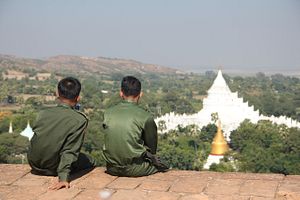On Monday, Myanmar moved forward with the appointment of a new home minister. The appointment once again put the spotlight on the country’s management of political and security issues as well as the current state of civil-military relations more specifically.
As I have observed before in these pages, governance in Myanmar remains a complex and contested affair, with the National League for Democracy (NLD) ruling the country but the military, known as the Tatmadaw, still exercising significant political influence in the country in official and unofficial ways. The military is guaranteed a quota of seats in parliament and control of key ministries – defense, border, and home affairs – under a 2008 military-drafted constitution, with the heads of the three ministries nominated by the military chief and the president appointing them with the approval of Parliament.
On Monday, the civil-military dynamics at play in Myanmar were in the spotlight again with the approval of a new home minister – the post responsible for administering internal affairs including intelligence, the police, and the country’s prisons. Lieutenant General Soe Htut was appointed the country’s new home affairs minister at a parliamentary session at the capital of Naypyidaw on Monday, replacing Kyaw Se who was stepping down.
Soe Htut is no stranger to military and politics: he is the son of the late Lun Maung, a former minister at the prime minister’s office who died in a helicopter crash in Myanmar back in 2001. Soe Htut has led the office of the chief of military security affairs since 2016; other previous positions include stints as commander of Eastern Central Command and Central Command.
Given his past record and current links within the military, the personnel change will largely be seen as representing continuity, even though some analysts had speculated that Kyaw Se’s removal was partly due to his close relationship with Aung San Suu Kyi and the trust placed in him by Myanmar’s military chief Min Aung Hlaing.
That said, the extent to which this is true will manifest itself over the next few months once Soe Htut begins exercising his authority, be it policy changes made on the security side or his relationship with the NLD and Suu Kyi during an election year. It will also be important to assess what this means for wider military developments as well. For instance, The Irrawaddy said in a report on February 10 that it had recently learned that there would be an impending reshuffle of positions in the military per a decision made at a Tatmadaw quarterly meeting, even though it could not independently confirm those reports.

































